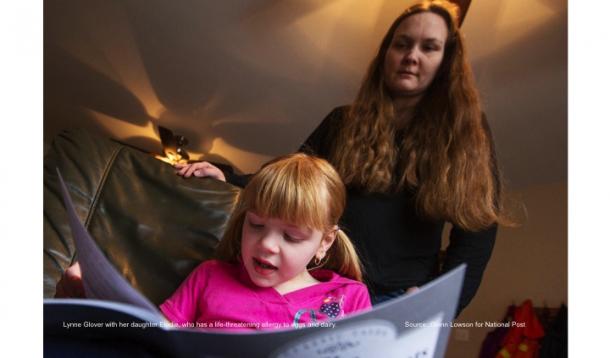
When accommodating life-threatening allergies, is there a point at which we have to draw the line? How far should we go, in a school setting, to protect kids with these allergies? A Hamilton mother has filed a complaint to the Human Rights Commission, stating that her daughter's school discriminated against her daughter and failed to protect her from life-threatening allergens.
As you probably are aware by now, I’m a supporter of food bans in classrooms to protect those with life-threatening allergies. And I certainly appreciate that there is a full nut-ban in my son’s school (in all Ontario schools, actually), because it gives me more confidence that my son won’t mistakenly consume anything he’s allergic to, but how far can we really go? Can we remove allergens from entire schools for one child? Could this case be the start of a new reality for schools?
Time and again, I hear people question what “these kids” will do in the “real world,” and, you know, that’s a good point. I can’t protect my son against the entire world’s love of peanut butter. I can’t be absolutely sure that the doorknob he touches at the mall isn’t contaminated. And I don’t expect the world to restrict foods for our sake.
Lynne Glover, mother to Elodie, told the National Post she is “not looking for a guaranteed allergy-free environment, because I know it’s not possible. But reasonable accommodations that fall in line with our doctor’s diagnosis is just plain common sense.” So what exactly are “reasonable accommodations”? Well, to Glover that means removing all dairy and eggs from the school, and sending the staff for human rights training. According to her, “anything short of that is discrimination.”
Hm. I tend to disagree with Ms. Glover. I feel like we have to draw the line somewhere with our expectations, and completely eliminating dairy, eggs, and nuts from the entire school is an impossible feat. It's barely manageable to remove nuts (it's shocking how many people don't realize almonds are nuts) from schools.
In my son’s class, there is a child with severe dairy and eggs allergies, too, and his classroom is not dairy- or egg-free, but the child is closely supervised and kept away from kids eating those foods. Hygiene is monitored closely and surfaces are cleaned multiple times during the day—these are accommodations approved by the child’s parents. I'm not sure I could be so confident, but the child's parents worked with the teachers and this is their plan. In my son’s case, he often misses out on eating at events when we’re unable to feel confident something is nut-free—this is just reality for most allergic people. In nursery school, my son was still allergic to dairy, eggs, and nuts, and we provided his snacks and he was kept away from kids who consumed those products until they could be washed up. It didn’t scar my son emotionally. It kept him safe, though.
To build a human rights complaint case around a child feeling isolated and discriminated against does the kid no good at all. We explain to my son that not everyone is allergic, but he is, so we have to take precautions. It means no ice cream shops or baked goods from friends. It means a lot of limitations, but it also means he’s fairly safe. And if framed differently for Elodie, I feel she could attend her school and feel safe instead of having her mother paint her as a victim.
I’d love to hear your take on how far schools should be expected to go to accommodate allergies in the classrooms (or entire schools).